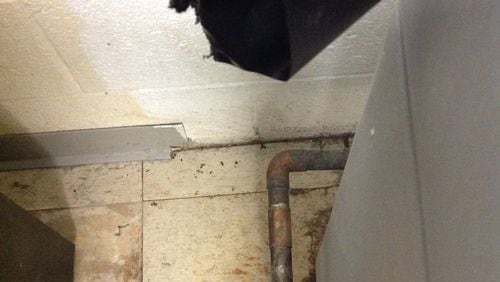The doctor who publicly criticized the operation of Georgia’s prison hospital when he resigned earlier this year has filed a lawsuit accusing state officials of forcing him out of his job for previously leaking information to The Atlanta Journal-Constitution.
The federal lawsuit filed by Dr. Timothy Young asserts that those responsible for managing Augusta State Medical Prison suspected that he was a source for AJC articles about the facility and made his already “deplorable” working conditions so difficult he had to resign.
Those in charge “knew or should have known” that their conduct violated “established principles for free speech by fellow professionals,” the suit states. Their actions also violated the Georgia Whistleblower Act, the suit says.
The lawsuit, filed last week in Atlanta, names both the Georgia Department of Corrections and Georgia Correctional HealthCare as defendants. It also names Dr. Billy Nichols, the statewide medical director for Georgia Correctional HealthCare, and Ted Philbin, the warden at Augusta State Medical Prison.
Georgia Correctional HealthCare, the branch of Augusta University that provides medical services for the state’s public prisons, was Young’s employer. Nichols was his immediate supervisor.
In addition to the damages Young argues he’s due from the Department of Corrections and Georgia Correctional HealthCare for violating his rights as a whistleblower, he is seeking damages for mental pain and anguish caused by Nichols’ alleged “deliberate indifference to his rights to express himself about matters of public concern.”
The suit also cites specific damages caused when Young gave up his $191,000 annual salary, his medical benefits and years of service in the Teachers’ Retirement System.
Christen Engel, Augusta University’s associate vice president for news and communications, said the school couldn’t comment on the lawsuit because, “as a practice,” it doesn’t comment on pending litigation.
Joan Heath, the director of the Department of Corrections’ Office of Public Affairs, also said the department couldn’t comment because litigation is pending.
Young, who has worked for an Augusta urgent care company since leaving his job at the prison hospital, referred all comment on the lawsuit to his attorney, Mike Brown. Brown said Monday he wanted to “wait and see” where the suit leads before saying anything about it.
Young was a source for a series of stories in the AJC in 2017 describing the unsafe and unsanitary conditions inside the Grovetown facility.
The newspaper detailed a multitude of issues that had long been ignored, including leaking ceilings that had led to the growth of so-called black mold, broken toilets and showers in the dormitory where inmates recover from surgery and security breaches that had caused nurses to quit in fear for their lives.
The stories prompted the Department of Corrections to undertake a major cleanup of the facility and make changes in its management structure.
At Young’s request, the AJC didn’t identify him as a source. However, when he resigned in January of this year, he agreed to an interview with the newspaper in which he publicly acknowledged his role in its articles.
Young, 49, had worked at Augusta State Medical Prison for 16 years and was the medical director of its outpatient clinic when he resigned, doing so with a scathing letter to his superiors.
In the letter, which he released to the AJC at the time, Young wrote that he had dealt with “ever-increasing” security breaches, incurred professional liability because of the “extreme dysfunction” in the delivery of health care and seen his own health decline because of the prison hospital’s crumbling environment. He also wrote that he had faced “smoldering and overt hostility” for trying to address those problems.
Young’s lawsuit, while covering much of the same ground, goes farther in detailing several instances that the doctor believes show that he faced retaliation for taking his concerns to the AJC.
According to the lawsuit, Young began questioning how Augusta State Medical Prison was being managed in 2012 and complained to Nichols for several years before feeling it necessary to go to the media in September 2017.
Young didn’t disclose to his supervisors that he’d played a role in the AJC’s articles, but “the suspicion among the management and staff was that (he) had divulged information to the author on a confidential basis,” the lawsuit says.
Consequently, the suit contends, the conditions of Young’s employment were “altered substantially.” His requests for patient care were ignored or unnecessarily delayed, security for his staff was diminished and he was placed under “unusual scrutiny,” the suit says.
Finally, the suit states, Young was informed by the facility’s medical director, Dr. Mary Sherryl Alston, last December that his position was going to be “evaluated” for need. According to the lawsuit, Young interpreted the conversation to mean he would soon be fired.
“(Young) was threatened with termination, and, in keeping with his professional career, felt compelled to resign before he was terminated,” the suit says.
The story so far
The Atlanta Journal-Constitution first exposed the dangerous and unsanitary conditions at Augusta State Medical Prison a year ago and has continued to follow the story.
In a series of articles in 2017, the newspaper detailed how the facility, the flagship of Georgia’s prison healthcare system, had long been plagued by scores of problems, some of which directly impacted patient care.
The AJC described how flies and other insects swarmed in the operating room because bags of garbage were stored outside; how leaking roofs, neglected for years, had caused so-called black mold to grow in critical areas; how security lapses had made nurses fearful for their lives and led some to quit; and how inmates recovering from surgery had been forced to use broken toilets and showers.
The newspaper’s stories led to the hiring of a new warden and hospital administrator. They also prompted the Georgia Department of Corrections to begin an extensive cleanup of the 34-year-old facility and make changes in its management structure.








